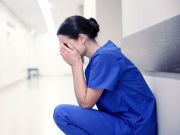- Could Your Grocery Store Meat Be Causing Recurring UTIs?
- Are You Making This Expensive Thermostat Error This Winter?
- Recognizing the Signs of Hypothyroidism
- 10 Strategies to Overcome Insomnia
- Could Artificial Sweeteners Be Aging the Brain Faster?
- Techniques for Soothing Your Nervous System
- Does the Water in Your House Smell Funny? Here’s Why
- Can a Daily Dose of Apple Cider Vinegar Actually Aid Weight Loss?
- 6 Health Beverages That Can Actually Spike Your Blood Sugar
- Treatment Options for Social Anxiety Disorder
Sleep Troubles Hit Health Care Workers During Pandemic

Many health care workers on the front lines of the coronavirus pandemic are struggling with sleep, a new study finds.
The researchers also found that those with insomnia were more likely to have depression, anxiety and stress-based trauma.
The study included nearly 1,600 health care workers who completed an online questionnaire between January 29 and February 3 at the peak of the COVID-19 outbreak in China.
Two-thirds (36%) reported insomnia symptoms. Overall rates of depression were much higher among those with insomnia (87%) than among those without insomnia (31%), and especially for moderate (23% versus 3%) and severe (17% versus 2%) depression.
The percentages and differences between those with and without insomnia were similar for anxiety and stress-based trauma, according to the study published April 14 in the journal Frontiers in Psychiatry.
The most important factor associated with insomnia among health care workers was strong uncertainty about effective disease control among medical staff. Strong uncertainty was 3.3 times higher among those with insomnia than those without it, the findings showed.
Lower levels of education were also associated with insomnia. Health care workers with a high school education or less were 2.7 times more likely to have insomnia than those with a doctoral degree, according to the report.
Workers with less education may be more likely to be fearful, study co-author Bin Zhang, a professor at Southern Medical University in Guangzhou, China, and colleagues suggested.
“Typically, stress-related insomnia is transient and persists for only a few days,” Zhang said in a journal news release. “But if the COVID-19 outbreak continues, the insomnia may gradually become chronic insomnia in the clinical setting.”
The researchers noted that the health care workers in the study had high levels of stress in general because they were in close contact with infected patients who could pass the disease to them, they were worried about infecting their own family and friends, and they had to wear extensive personal protective equipment for more than 12 hours at a time.
“Under these dangerous conditions, medical staff become mentally and physically exhausted, and therefore experience an increased risk of insomnia due to high stress,” the study authors wrote.
More information
The American Academy of Family Physicians has more on insomnia.
Source: HealthDay
Copyright © 2026 HealthDay. All rights reserved.










